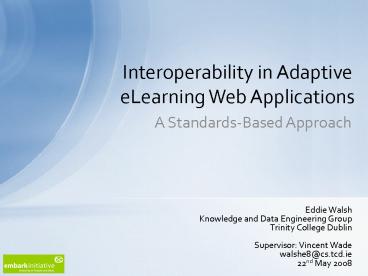Interoperability in Adaptive eLearning Web Applications - PowerPoint PPT Presentation
1 / 14
Title:
Interoperability in Adaptive eLearning Web Applications
Description:
Interoperability in Adaptive eLearning Web Applications. A Standards-Based Approach. Eddie Walsh. Knowledge and Data Engineering Group. Trinity College Dublin ... – PowerPoint PPT presentation
Number of Views:45
Avg rating:3.0/5.0
Title: Interoperability in Adaptive eLearning Web Applications
1
Interoperability in Adaptive eLearning Web
Applications
- A Standards-Based Approach
Eddie Walsh Knowledge and Data Engineering
Group Trinity College Dublin Supervisor Vincent
Wade walshe8_at_cs.tcd.ie 22nd May 2008
2
Overview
- Research Motivation
- IMS Tools Interoperability
- FUMES
- Research Progress
3
Research Motivation
- Interoperability between elearning systems
- becoming easier
- xml and web services
- IMS Tools Interoperability (IMS TI)
- Interoperability between adaptive elearning
systems - more complex
- provides personalisation based on the user model
- preferences, competencies
- different systems have different types
- standardised IMS LIP, IEEE PAPI
- custom xml databases
- difficult to exchange between them
4
Research Motivation
- General Interoperability Issues
- Syntactic heterogeneity
- different interfaces
- different data models
- Semantic heterogeneity
- different vocabularies and different perspectives
on the data - different terms used to describe similar concepts
e.g. 'Author', 'Creator', and 'Composer' - identical terms used that mean very different
things - introduces confusion and error
5
Research Motivation
This research investigates the issues of
syntactic and semantic user interoperability in
heterogeneous elearning systems
6
IMS Tools Interoperability
- IMS TI enables applications to be built which
allow functionality sharing - learning applications are integrated into a
system as easily as an RSS feed - can be used in a wide range of Learning
Management Systems (LMS) - set of simple standardized web services which
exchange information between a LMS and an
external application - externally hosted application appears seamlessly
in the LMS
7
IMS Tools Interoperability
8
IMS Tools Interoperability
9
FUMES
- Federated User Model Exchange Services
- FUMES is a tool to exchange user model
information between two systems using web
services - Works at the syntactic and semantic level using
ontologies - An ontology is a description of concepts and
their relationships in a domain - FUMES combined with IMS TI provides user model
and functionality integration of heterogeneous
elearning tools
10
FUMES IMS TI
11
FUMES IMS TI
12
FUMES Architecture
13
Research Progress
- Completed
- LMS (Sakai) adaptive tool (ASPIRE)
- both IMS TI compliant
- first version of FUMES
- provides basic exchange of user events between
Sakai and ASPIRE using web services - Current
- second version of FUMES
- semantic interoperability
- IMS LIP ontology user interface
- Future
- evaluation
14
Questions?
Eddie Walsh Knowledge and Data Engineering
Group Trinity College Dublin Supervisor Vincent
Wade walshe8_at_cs.tcd.ie 22nd May 2008































